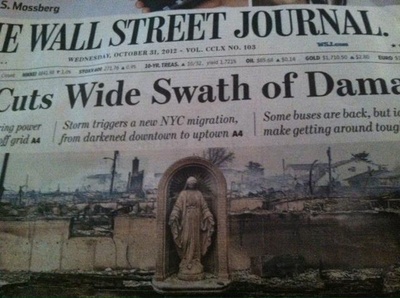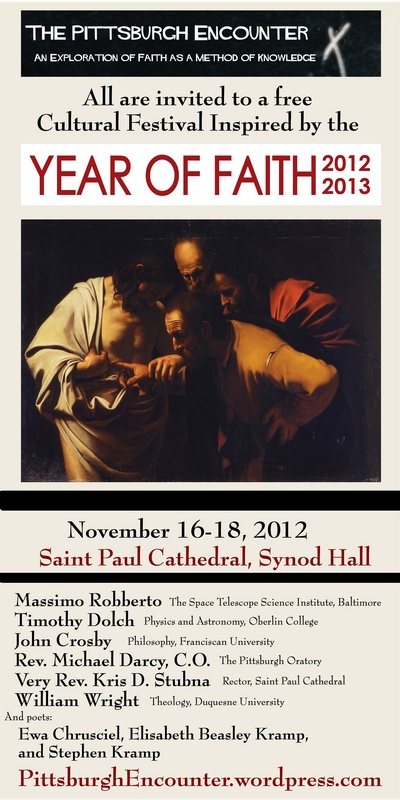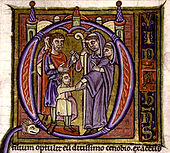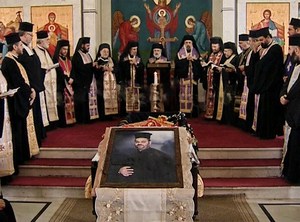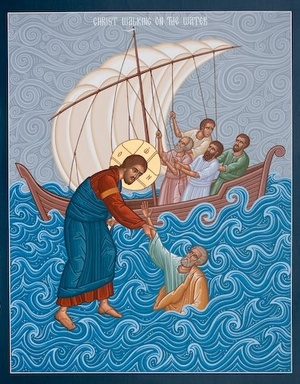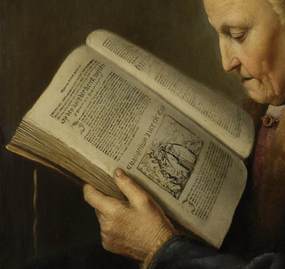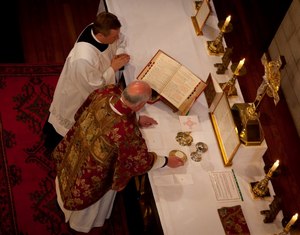 For Catholics it is Sunday, not the Sabbath (Saturday) in the technical sense as it applies to Jewish theology, but it is the day of worship of the One Triune God in the Triumph of death by death itself; it is Sunday which commemorates the Resurrection of Jesus, that is the fulfillment of the Paschal Mystery (life, death, Resurrection and Ascension of the Lord). Sunday is the perpetual Day of the Lord in practice.
For Catholics it is Sunday, not the Sabbath (Saturday) in the technical sense as it applies to Jewish theology, but it is the day of worship of the One Triune God in the Triumph of death by death itself; it is Sunday which commemorates the Resurrection of Jesus, that is the fulfillment of the Paschal Mystery (life, death, Resurrection and Ascension of the Lord). Sunday is the perpetual Day of the Lord in practice.
Pope Benedict’s prayer intentions for November 2012
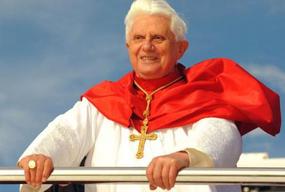 Praying with and for another expands our life, it gives us a new point of view. This is especially true when we unite ourselves in prayer with the monthly prayer intentions published by the Apostleship
Praying with and for another expands our life, it gives us a new point of view. This is especially true when we unite ourselves in prayer with the monthly prayer intentions published by the Apostleship
of Prayer, and published here on the Communio blog on first day of the month.
be consider as the Pope’s personal prayer group. Blessed John Paul II wrote in
1985 of the Apostleship of Prayer as “a precious treasure from the Pope’s heart
and the Heart of Christ.” Since 1844, the Apostleship has been a work of the
Society of Jesus and there are some 50 million apostles praying with and for
the Holy Father. Consider joining the Apostleship of Prayer by visiting the link above.
the Gospel may bear the courageous witness of fidelity to the crucified and
risen Lord.
light to the nations.
you for the Church.
All Saints
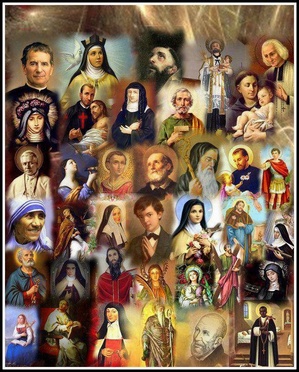 Let us all rejoice in the Lord, as we celebrate the feast day in honor of all the Saints, at whose festival the Angels rejoice and praise the Son of God. (Entrance Antiphon for Mass)
Let us all rejoice in the Lord, as we celebrate the feast day in honor of all the Saints, at whose festival the Angels rejoice and praise the Son of God. (Entrance Antiphon for Mass)
BVM undamaged in storm
The Pittsburgh Encounter 2012
things – in everything, from the boughs of the tree to the hairs of the person
you like — the presence of the Mystery that became a man in flesh and blood…
Getting used to seeing this in everything is a history that God allowed you to
begin.”
No charge for sacraments
I read a news item by an Italian journalist bringing to light a recent letter of the Most Reverend Socrates Villegas, VP of the Catholic Bishops’ Conference of the Philippines where he sternly criticized the practice of priests charging for the administration of sacraments and sacramentals. Villegas said, in part,
My dear brother priests, the sacraments are not to be celebrated in exchange for money. The trafficking for money in spiritual things is simony. It is a sin.
Gianna Center –Keeping hope alive for infertile couples
 An ad on the back cover of the Catholic New York sparks me to draw the attention of Communio readers and others to the good work of The Gianna Center and the founders, Dr. Anne Nolte and Dr. Kyle Beiter.
An ad on the back cover of the Catholic New York sparks me to draw the attention of Communio readers and others to the good work of The Gianna Center and the founders, Dr. Anne Nolte and Dr. Kyle Beiter.
Continue reading Gianna Center –Keeping hope alive for infertile couples
Conflict in Syria close to home
A friend of
mine, a Melkite priest, in fact, alerted his friends that a cousin of his in
Aleppo was abducted by terrorists and days later released. A tense time no
doubt. We are grateful to the Lord the young man’s return.
Of concern, too, is the assassination of a Greek Orthodox priest near
Damascus. Father Fadi Jamil Haddad, 43, pastor of St. Elias Church in Qatana,
outside Damascus, found slain on October 26, shot in head, in the Jaramana district
of the capital. Vatican news people report that an “unidentified armed group” was responsible. $715,000 was
demanded. Further details are really unclear.
Of the Christian minority in
Syria, the Greek Orthodox is known as the largest; Christians represent perhaps
10% of the population. Make no mistake, Christians have long been resident in
Syria now a majority Muslim.
Prayer at the Threat from Malevolent Winds and Sea Storm
An Orthodox friend of mine posted this prayer and icon in light of the weather storm Sandy coming our way, and I am reposting. State government predictions are sounding exaggerated right now, but one can really tell. In Connecticut, along the waterfront, it is predicted that four high tide cycles will be exceptional, and rough weather–high winds and rain– over 36-48 hours. In category four areas more than 362 thousand people expect some inconvenience. Let’s not tempt fate. In charity, let’s pray to the Divine Master, “A Prayer at the
Threat from Malevolent Winds and Sea Storms.”
O Master, Lord our God, Who by Thy
Consubstantial and Un-originate Word, and Thy Life-Giving Spirit Who is equal in
honor, hast brought all things out of nothingness into being; Who hast
established the sand as bounds to the sea, and weighed the mountains and the
valleys in a balance; Who hast measured the skies and holdest the water in the
palm of Thy hand; Who hast given to this visible world of the senses its laws
and rules, its harmony and order; Who hast appointed changes to the weather and
variations in the orbit of the sun; Who, through the mingling of the elements,
holdest all things together by Thine inexpressible power, and keepest them free
from harm and intact: Do Thou Thyself, O All-Good King, extending to us Thine
innate and customary love and goodness, visit the work of Thy hands. Do not
deprive us of Thy mercies and Thy compassion, and do not destroy Thine
inheritance, for Thou hast ineffably created us in Thine own image.
Continue reading Prayer at the Threat from Malevolent Winds and Sea Storm
Work to regain the light of faith lost, or weakened, Pope preaches
The Pope’s homily at the close of the Synod of Bishops on the New Evangelization.
The miracle of
the healing of blind Bartimaeus comes at a significant point in the structure
of Saint Mark’s Gospel. It is situated at the end of the section on the
“journey to Jerusalem”, that is, Jesus’ last pilgrimage to the Holy City, for
the Passover, in which he knows that his passion, death and resurrection await
him. In order to ascend to Jerusalem from the Jordan valley, Jesus passes
through Jericho, and the meeting with Bartimaeus occurs as he leaves the city –
in the evangelist’s words, “as he was leaving Jericho with his disciples and a
great multitude” (10:46). This is the multitude that soon afterwards would
acclaim Jesus as Messiah on his entry into Jerusalem. Sitting and begging by
the side of the road was Bartimaeus, whose name means “son of Timaeus”, as the
evangelist tells us. The whole of Mark’s Gospel is a journey of faith, which
develops gradually under Jesus’ tutelage. The disciples are the first actors on
this journey of discovery, but there are also other characters who play an
important role, and Bartimaeus is one of them. His is the last miraculous
healing that Jesus performs before his passion, and it is no accident that it
should be that of a blind person, someone whose eyes have lost the light. We
know from other texts too that the state of blindness has great significance in
the Gospels. It represents man who needs God’s light, the light of faith, if he
is to know reality truly and to walk the path of life. It is essential to
acknowledge one’s blindness, one’s need for this light, otherwise one could
remain blind for ever (cf. Jn 9:39-41).
Continue reading Work to regain the light of faith lost, or weakened, Pope preaches
